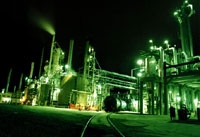Dear Umbra,
Longtime reader; first-time writer. Love the column.
My partner and I recently bought a small station wagon to replace our 4WD pick-up and ’83 sedan. After some debate, we chose a turbo-diesel engine that boasts about 45 miles per gallon instead of a gas engine, which gets about 30 MPG. Our thinking led us to choose the higher fuel efficiency and lower CO2 emissions of the diesel engine, although the gas engine produces fewer particulate emissions, sulfur, and other nasties.
Would you please comment on our decision, and also help us understand the other pollution and energy costs incurred during the refining of diesel and gasoline? Not sure if where we drive is important, but it is mostly on the wet side of the Cascades in the Pacific Northwest.
Thank you; and thanks for having such a cool name.
Steve Thompson
Dearest Steve,
Let’s recall some stale high school stereotypes: the cruel football player and the catty cheerleader. Diesel oil is the football player — big, strong, lunk-headed, unwashed, and mean. Gasoline is the cheerleader: slimmer, well-groomed, and socially manipulative. They’re both toxic to the school atmosphere, but people are more inclined to avoid the bully, because he is more immediately physically hazardous.
In California, diesel exhaust is listed as a known carcinogen, is the most significant source of airborne toxins, and accounts for 70 percent of the cancer risk from air pollution. So, we can see what your neighbors to the south think of your decision.

That unhealthy glow.
Photo: NREL.
As for the refining process: When you refine a barrel of crude oil, you get some gasoline, some diesel, and some other stuff, including such nasties as chlorinated wastewater and the gaseous chemical byproducts of combustion. It’s all the same process, so you can’t avoid the manufacture of diesel by buying only gasoline. The toxics created by oil refineries are bad for the environment at large and disproportionately affect the people — mainly poor people — who live nearby. Good ol’ Environmental Defense gives a pithy description of the environmental impact of refineries and suggestions for actions to get them cleaned up.
Although refinery pollution is bad, pollution from vehicles is considered a more pressing environmental issue, as most of us are closer to the tailpipe than to the smokestack. As we toodle along the road, our tailpipe exhales carbon dioxide, nitrogen oxides, hydrocarbons, and sulfur dioxide. Such chemicals bring us ozone, particulate matter, acid rain, nitrification of water bodies, respiratory ailments, lung disease, cancer, smog, and of course climate change; these are the shadows that trail behind our cars.
Diesel engines are more culpable than gasoline on almost all counts. This is in part because diesel is dirtier. Also, gasoline-powered engines have been targeted for cleanup in the past several decades, with regulatory standards such as unleaded gas and the catalytic converter resulting in somewhat cleaner emissions. Diesel is just beginning that process, but currently, the allowable emissions from diesel exhaust are rather horrifying.
By way of summation, all diesel cars are considered “inferior” in the American Council for an Energy-Efficient Economy’s Green Book. I feel this may not be welcome news to you. My apologies.
Yours truly,
Umbra

